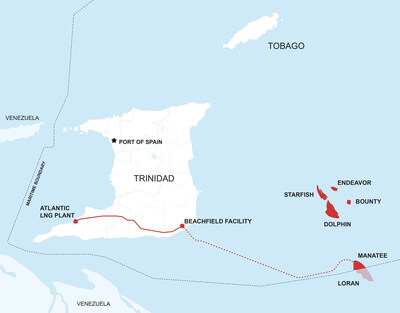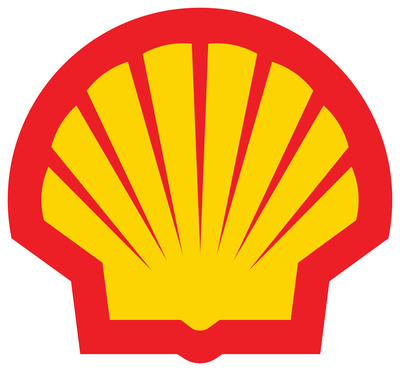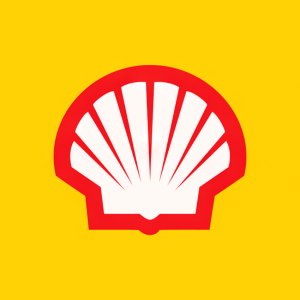Shell boosts LNG business with Manatee FID in Trinidad and Tobago
Rhea-AI Summary
Shell Trinidad and Tobago, a subsidiary of Shell, has taken the Final Investment Decision (FID) on the Manatee project, an undeveloped gas field in the East Coast Marine Area (ECMA).
The project will enhance Shell's LNG business, utilizing existing assets to meet global and domestic energy needs. Manatee aims to increase Shell's LNG business by 20-30% and liquefaction volumes by 25-30% by 2030. Production is expected to start in 2027, reaching a peak of approximately 104,000 barrels of oil equivalent per day (boe/d).
The Manatee field, discovered in 1983, will involve an installation platform with eight development wells linked to Shell's onshore Beachfield gas processing facility via a 110 km pipeline. The project underscores Shell's commitment to LNG as a critical component of the energy transition.
Positive
- Shell's LNG business is expected to grow by 20-30% by 2030.
- LNG liquefaction volumes are planned to grow by 25-30% by 2030.
- Manatee's production will peak at approximately 104,000 boe/d.
- The project utilizes existing assets, maximizing value and reducing emissions.
Negative
- Production from the Manatee project will not start until 2027.
News Market Reaction 1 Alert
On the day this news was published, SHEL declined 0.19%, reflecting a mild negative market reaction.
Data tracked by StockTitan Argus on the day of publication.
PORT-OF-SPAIN, Trinidad and
Manatee will allow Shell to competitively grow its Integrated Gas business by building on development efforts in the ECMA, one of the country's most prolific gas-producing areas. The ECMA is currently home to Shell's largest gas-producing fields in the country including Dolphin, Starfish, Bounty and Endeavour.
The Manatee gas field will provide backfill for the country's Atlantic LNG facility. Increasing utilization at existing LNG plants is an important lever to maximize potential from Shell's existing assets.
"This project will help meet the increasing demand for natural gas globally while also addressing the energy needs of our customers domestically in
Shell plans to grow its LNG business by 20
Manatee is slated to start production in 2027. Once online, Manatee is expected to reach peak production of approximately 104,000 barrels of oil equivalent per day (boe/d) (604 MMscf/d).
Notes to editors
- Shell is the operator of Manatee with a
100% working interest under the sub-Block 6D Production Sharing Contract. - The Loran-Manatee field was discovered in 1983 and subsequently appraised via four wells. Loran represents the portion of the field in Venezuelan waters and Manatee represents the portion of the field in
Trinidad and Tobago waters. - In 2007 the Government of
Trinidad and Tobago (GORTT) and the Government ofVenezuela (GOVEN) signed a Framework Treaty covering all cross-border fields and in 2010 signed a Unitization Agreement specifically covering Loran-Manatee. - In 2019, GORTT and GOVEN terminated the Unitization Agreement and entered into another government-to-government agreement, allowing each country to independently develop its respective share of the Loran-Manatee field.
- The project will involve a Normally Unattended Installation platform located in the ECMA acreage with eight development wells via a 110 km 32" pipeline to the Shell-operated onshore Beachfield gas processing facility, for onward export to the Atlantic LNG facility, and to the National Gas Company of
Trinidad and Tobago for the domestic gas market. - Shell believes LNG will play a critical role in the energy transition, replacing coal in heavy industry. It also has a continued role in displacing coal in power generation, helping to reduce local air pollution and carbon emissions. LNG helps to provide the flexibility the power system needs, at a time when renewable generation is growing rapidly. Find out more in Shell's Energy Transition Strategy 2024.
- Global demand for LNG is estimated to rise by more than
50% by 2040, as industrial coal-to-gas switching gathers pace inChina , South Asian and South-east Asian countries. These countries are expected to use more LNG to support their economic growth, according to Shell's LNG Outlook 2024.
Cautionary note
The companies in which Shell plc directly and indirectly owns investments are separate legal entities. In this media release "Shell", "Shell Group" and "Group" are sometimes used for convenience where references are made to Shell plc and its subsidiaries in general. Likewise, the words "we", "us" and "our" are also used to refer to Shell plc and its subsidiaries in general or to those who work for them. These terms are also used where no useful purpose is served by identifying the particular entity or entities. ''Subsidiaries'', "Shell subsidiaries" and "Shell companies" as used in this media release refer to entities over which Shell plc either directly or indirectly has control. The term "joint venture", "joint operations", "joint arrangements", and "associates" may also be used to refer to a commercial arrangement in which Shell has a direct or indirect ownership interest with one or more parties. The term "Shell interest" is used for convenience to indicate the direct and/or indirect ownership interest held by Shell in an entity or unincorporated joint arrangement, after exclusion of all third-party interest.
Forward-Looking Statements
This media release contains forward-looking statements (within the meaning of the
Shell's Net Carbon Intensity
Also, in this media release we may refer to Shell's "Net Carbon Intensity" (NCI), which includes Shell's carbon emissions from the production of our energy products, our suppliers' carbon emissions in supplying energy for that production and our customers' carbon emissions associated with their use of the energy products we sell. Shell's NCI also includes the emissions associated with the production and use of energy products produced by others which Shell purchases for resale. Shell only controls its own emissions. The use of the terms Shell's "Net Carbon Intensity" or NCI are for convenience only and not intended to suggest these emissions are those of Shell plc or its subsidiaries.
Shell's net-zero emissions target
Shell's operating plan, outlook and budgets are forecasted for a ten-year period and are updated every year. They reflect the current economic environment and what we can reasonably expect to see over the next ten years. Accordingly, they reflect our Scope 1, Scope 2 and NCI targets over the next ten years. However, Shell's operating plans cannot reflect our 2050 net-zero emissions target, as this target is currently outside our planning period. In the future, as society moves towards net-zero emissions, we expect Shell's operating plans to reflect this movement. However, if society is not net zero in 2050, as of today, there would be significant risk that Shell may not meet this target.
Forward-Looking non-GAAP measures
This media release may contain certain forward-looking non-GAAP measures such as cash capital expenditure and divestments. We are unable to provide a reconciliation of these forward-looking non-GAAP measures to the most comparable GAAP financial measures because certain information needed to reconcile those non-GAAP measures to the most comparable GAAP financial measures is dependent on future events some of which are outside the control of Shell, such as oil and gas prices, interest rates and exchange rates. Moreover, estimating such GAAP measures with the required precision necessary to provide a meaningful reconciliation is extremely difficult and could not be accomplished without unreasonable effort. Non-GAAP measures in respect of future periods which cannot be reconciled to the most comparable GAAP financial measure are calculated in a manner which is consistent with the accounting policies applied in Shell plc's consolidated financial statements.
The contents of websites referred to in this media release do not form part of this media release.
We may have used certain terms, such as resources, in this media release that the United States Securities and Exchange Commission (SEC) strictly prohibits us from including in our filings with the SEC. Investors are urged to consider closely the disclosure in our Form 20-F, File No 1-32575, available on the SEC website www.sec.gov.
![]() View original content to download multimedia:https://www.prnewswire.com/news-releases/shell-boosts-lng-business-with-manatee-fid-in-trinidad-and-tobago-302191392.html
View original content to download multimedia:https://www.prnewswire.com/news-releases/shell-boosts-lng-business-with-manatee-fid-in-trinidad-and-tobago-302191392.html
SOURCE Shell









